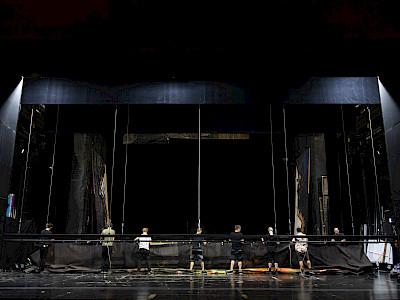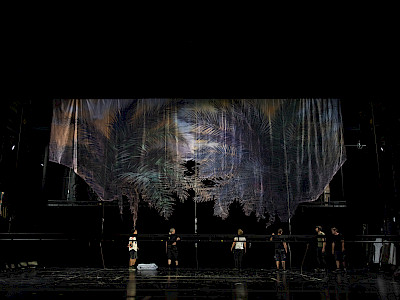01 — 03.06.2023
Amanda Piña Santiago de Chile-Mexico City-Vienna
EXÓTICA
dance — premiere
| English → FR, NL | ⧖ 1h20 | €22 / €18 | May contain nudity
A tropical jungle based on a historical decor occupies the stage of Théâtre Royal des Galeries. The painted palm trees evoke the exotic fantasies of another time. In this spectacular scenography, a choreography emerges mixing rapid movements and unconventional rhythms danced by performers wearing mirror-clad costumes. Choreographer Amanda Piña creates an exuberant ritual conceived as a séance through which dancers evoke their spiritual ancestors and come into conversation with the audience’s gaze. Their presence opens a space for invocation, exorcism, and celebration. For this presentation, the festival is welcomed for the very first time in the magical hall of Théâtre Royal des Galeries. In this Italian-style theatre, we find evidence of former splendour; red and gold velvet, a monumental chandelier, and the ceiling fresco by René Magritte. This Art Deco temple recalls an era when Black and artists of colour had to don exotic costumes before being given a place on stage. Amanda Piña and her team reinstall these forgotten and invisibled artists in the European canon with an evening of dance not to be missed!
Intoxicating the colonial gaze
Notes on forms of fractal queering in EXÓTICA
EXÓTICA presents itself as a ritual invocation conceived as a séance and a celebration of ancestral relational worlds. By hosting the re-appearance of four different glamorous but dispossessed artists active in the 1920’s on European stages, the prevalent conception of dance as a formal composition of movement, always already translated into an aesthetic object for distant observation is profoundly broken.
The slithering reappearance of Nyota Inyoka, François Benga, Leyla Bederkhan and La Sarabia, unfolds in the break, through what Amanda Piña calls a practice of composession, reworking the idea of composition by fusing it with the notion of possession.(1) Composession then allows for a deep relational experience that goes beyond the contemporary separations between time and space, subject, and object. Through this somatic approach the dancers Ángela Muñoz Martínez, Kabangu Bakambay André, iSaAc Espinoza Hidrobo, Venuri Perera and Amanda Piña herself, allow different dances to take body in content and form, hosting and absorbing energetic qualities and states of being of the invoked artists, through interpellation, mimesis and reproduction of postures, expressions, awareness, and consciousness.(2)
As a corporeal answer to forms of dispossession, EXÓTICA is no longer a performance, or a re-enactment for and audience to see and applaud, but a practice of becoming through dance with the audience, allowing their senses in turn to be possessed and recomposed through induced visions. By genuinely holding space and caring for who precedes them, the dancers on stage acquire the qualities of the hosted dancers, their agency, their agile and lithe movements, their own sleek dances, to gradually become the very dancers who are invited and called in as a long-awaited guest. Summoning the re-appearance of ancestral forms of movement, then amounts to dancing with partially connected worlds, the different partially connected worlds that came before us.(3)
Nyota Inyoka (1896-1971), born from a mixed French-Asian marriage, developed a practice as a dancer and choreographer, she worked her way out of the Cabarets and colonial exhibition in Paris and Broadway in New York, to form her own company, the ‘Ballet Hindou’ and danced at various international museums, world fairs and biennales. Born in Dakar, François (Féral) Benga (1906-1957) quickly outgrew the roles assigned to him by the conventions of music hall and the revue in Paris, working with Josephine Baker amongst other, he firmly established himself as a dancer and choreographer in the surrealist movement and the Harlem Renaissance. Born in Kurdistan, Leyla Bederkhan (1903-1986) grew up in Cairo, where she got first acquainted with dance in the harem and the opera-house. Living in between Munich and Vienna, she studied dance and ballet and developed a practice that allowed her to go on tour in Europe and the USA, after which she founded her own dance school in the outskirts of Paris. Finally, La Sarabia (1894-1970) was a relative of Piña’s father. She left early to Paris to study dance and never came back to Mexico but invented a folkloric dance that was partly Brazilian and Spanish partly her own dance inspiration.
In the former splendor of the Art Deco Hall of Théâtre Royal des Galeries in Brussels, like their ancestors, Amanda Piña and the fellow artists with who she is working relate to past forms and formats of live entertainment that emerged in the late 19th early 20th century, to make an all in all very different proposition, looking for resistance in their ceremonial reproduction. Often associated with the Parisian cabaret tradition, the formats of vaudeville and revue showcased a diverse range of individual acts, at times loosely thematically integrated, mixing different genres and styles.
Her proposition is different, as the dancers on stage evoke and host their spiritual ancestors, forgotten and invisibilized artists in the European canon, not to reinstate their legacy in the canon, but to abolish it. They want to reappear and be remembered, undoing the violence of erasure. But together with those that came before them, the dancers on stage refuse to be reduced to a single being and turn the spectacle of vaudeville against itself. The invoked artists also worked with forms of ritual evocations, already hosting the reappearance of what came before them, allowing ancestral rhythms and ways of knowing, being and sensing the world otherwise to come to the fore. This turning against itself, can thus be come to terms with as a form of fractal queering, as an invocation within an invocation, a hosting within a hosting, a vaudeville within a vaudeville, a composession within a composession, reproducing itself in a simultaneity of parts and wholes, similarity, and difference, until it breaks. Emerging from the relations of partially connected past and present worlds, the units of past and present dancers are disrupted so they can re-emerge as intra-related, allowing for familiar and communal bodies to step in, in an endless kaleidoscopic permutation.(4)
Exoticism is in the eye of the beholder, in the colonial gaze, always turning difference into an object of commodity fetishism. Escaping the malicious binary between exposing or being exposed, the proposed invocation intoxicates, and by doing so deflects the gaze of the audience. The visions acquired through the process of purging, have the power to break alterity, and its logic of representation, to finally humble the unmarked male, sovereign colonial gaze from nowhere / everywhere, allowing communal forms to come to the fore. Intoxicating the one world art world and its institutional spaces then, not only allows the exorcising of the colonial exotic gaze of the audience transformed into a congregating whole with overlapping ancestries but abolishes the canon and brings into sight the dream of an art world where many art worlds fit.
- Joachim Ben Yakoub
- April 2023
- Joachim H. Ben Yakoub is a writer / researcher and lecturer operating on the border of different art institutions and schools in between and beyond Tunis and Brussels. He finds refuge in ‘The Kitchen’, a shared place in the center of the capital, where they hang out, cook and gossip, where they broadcast, reprint and study.
(1) Amanda Piña, “Ideas for a practice of ‘Compossession’”, in Amanda Piña, Angela Vadori, and Christina Gillinger-Correa Vivar (eds.). Endangered Human Movements Vol. 3 – The School of the Jaguar, Wien, pp. 283-295, 2019.
(2) Amanda Piña, “Hosting the Re-appearance of Nyota Inyoka. An Anatomy of the White Gaze.”, in Sandra Chatterjee, Franz Anton Cramer, Christina Gillinger-Correa Vivar, Nicole Haitzinger, and Amanda Piña (eds.), Contemporary Reflections on Nyota Inyoka, 2021.
(3) To engage with the idea of precedence as a movement towards the real, see Rolando Vázquez, Vistas of modernity: Decolonial aesthesis and the end of the contemporary, Mondriaan Fund Essay 014, 2020.
(4) To read more about fractals as a mathematical image for partial connections, see Marisol De la Cadena, Earth beings: Ecologies of practice across Andean worlds, Duke University Press, 2015.
Presentation: Kunstenfestivaldesarts, Kaaitheater, Théâtre Royal des Galeries
Artistic direction: Amanda Piña | With and by: Ángela Muñoz Martínez, André Bared Kabangu Bakambay, Venuri Perera, iSaAc Espinoza Hidrobo, Amanda Piña | Dramaturgy: Nicole Haitzinger | Integral design: Michiel Jimenez | Stage set and scenography: Forêt Asiatique (1921) by Albert Dubosq, reproduced by Decoratelier Jozef Wouters as part of Amanda Piña's contribution to Infini #18 (2022) | Technical direction: Santiago Doljanin | Light assistance in Brussels: Krispijn Schuyesmans | Music: Ángela Muñoz Martínez, Zevra | Lyrics: Amanda Piña | Singing: Venuri Perera, Angela Muñoz Martínez, André Bared Kabangu Bakambay, iSaAc Espinoza Hidrobo, Amanda Piña | Live music: Ángela Muñoz and performers | Sound design: Dominik Traun | Costumes: Federico Protto | Director’s assistant: Pierre-Louis Kerbart | Video documentation: CIRCA | Production and distribution: neon lobster/Giulia Messia & Katharina Wallisch
Production: Amanda Piña/Fortuna | Coproduction: Kunstenfestivaldesarts, Holland Festival, Festival d’Automne à Paris, Tanzquartier Wien, PACT Zollverein, DDD-Festival Dias da Dança, La Bâtie-Festival de Genève, NEXT Festival
Supported by: De Singel, KWP Kunstenwerkplaats, wpZimmer
Thanks to: Stadsschouwburg Kortrijk, Showtex, NTGent workshops, Bruno Forment, FWF funded project Border Dancing Across Time P-31958, Christina Gillinger-Correa Vivar (archival research), Rolando Vázquez (decolonial theory/interview)
Funded by the Cultural Department of the City of Vienna, Arts and Culture Division of the Federal Chancellery of Austria
Performances in Brussels with the support of Österreichisches Kulturforum in Brussels




